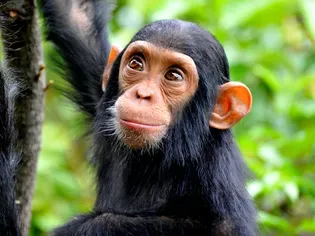Should You Keep a Chimpanzee as a Pet?
Updated on 04/26/24

Should You Keep a Chimpanzee as a Pet?
Introduction
The allure of owning an exotic animal as a pet is undeniable. Chimpanzees, with their remarkable intelligence and human-like characteristics, often capture the hearts and imaginations of those seeking a unique companion. However, before embarking on this extraordinary journey, it is imperative to delve into the complexities and responsibilities associated with keeping a chimpanzee as a pet. This comprehensive guide will explore the pros and cons, legal implications, and ethical considerations to help you make an informed decision about whether a chimpanzee is the right pet for you.
The Pros of Owning a Chimpanzee as a Pet
* Unparalleled Intelligence: Chimpanzees are exceptionally intelligent animals, possessing cognitive abilities that rival those of human children. They can communicate through sign language, solve complex puzzles, and demonstrate empathy and self-awareness.
* Strong Bonds: Chimpanzees are highly social creatures that form deep and lasting bonds with their caregivers. They are capable of expressing affection, playfulness, and protectiveness.
* Captivating Behavior: Chimpanzees are endlessly fascinating to observe. They exhibit a wide range of behaviors, from grooming and playing to tool use and hunting, providing a constant source of entertainment and education.
* Unique Perspective: Sharing your life with a chimpanzee offers a unique perspective on the natural world and human behavior. It can foster a deep appreciation for the interconnectedness of all living creatures.
The Cons of Owning a Chimpanzee as a Pet
* Extreme Physical Strength: Chimpanzees are incredibly strong animals. Even juvenile chimpanzees can possess the strength of an adult human. This poses significant safety risks, particularly in confined spaces.
* Complex Dietary Needs: Chimpanzees are omnivores with complex nutritional requirements. They require a specialized diet that mimics their natural food sources, which can be expensive and time-consuming to provide.
* Extensive Enrichment Needs: Chimpanzees are highly active and intelligent animals that require constant mental and physical stimulation. Providing adequate enrichment, such as climbing structures, puzzles, and social interactions, is essential for their well-being.
* Long Lifespan: Chimpanzees can live for over 50 years in captivity. This is a significant commitment, and potential owners must be prepared to provide lifelong care and companionship.
Legal Implications
* Federal and State Laws: Keeping a chimpanzee as a pet is illegal in many countries and states. It is crucial to check the laws in your jurisdiction before considering acquiring a chimpanzee.
* Special Permits and Licenses: In some areas where chimpanzees are permitted as pets, special permits or licenses are required. These often involve inspections of your home and the implementation of safety measures.
* Liability Insurance: Owning a chimpanzee carries significant liability risks. Comprehensive insurance is essential to protect yourself and others from any potential harm.
Ethical Considerations
* Wild vs. Captive-Bred: Chimpanzees are wild animals that are not suited for life in captivity. Captive-bred chimpanzees, while more adaptable, still have complex needs that may be difficult to fulfill in a domestic setting.
* Socialization and Isolation: Chimpanzees are highly social animals that require the companionship of their own kind. Keeping a chimpanzee in isolation can have devastating psychological consequences.
* Dangers to Humans: Chimpanzees can be unpredictable and aggressive, especially during adolescence and adulthood. They have been known to inflict serious injuries or even death on humans.
Examples of Challenges Faced by Chimpanzee Owners
* Lack of Veterinary Care: Chimpanzees have unique medical needs that require specialized veterinary care. Finding qualified veterinarians and accessing appropriate medications can be challenging.
* Conflicts with Neighbors: The presence of a chimpanzee in a residential area can create conflicts with neighbors who may be concerned about safety and noise.
* Financial Burden: The costs associated with keeping a chimpanzee are substantial. These include food, enrichment, veterinary care, insurance, and potential legal expenses.
* Abandonment and Neglect: Sadly, some chimpanzee owners become overwhelmed by the challenges of providing proper care. This can lead to abandonment or neglect, resulting in severe psychological and physical harm to the animal.
Conclusion
The decision of whether or not to keep a chimpanzee as a pet is complex and should not be taken lightly. While chimpanzees can be captivating and intelligent companions, they also pose significant risks and ethical challenges. It is essential to thoroughly research the legalities, potential dangers, and lifelong commitment involved. Only those who possess the space, financial resources, specialized knowledge, and unwavering dedication should consider taking on the responsibility of caring for a chimpanzee.
For those who are truly committed to providing the highest level of care, companionship, and enrichment, a chimpanzee can be a remarkable and rewarding companion. However, for the majority of people, the challenges and risks associated with owning a chimpanzee as a pet far outweigh the benefits. It is always in the best interests of the animal to live in a natural habitat or in an accredited sanctuary where its physical, social, and emotional needs can be fully met.
Explore More Pets

Exotic Pet Species
Should You Keep a Raccoon as a Pet?

Exotic Pet Species
How to Care for a Pet Mexican Red-Knee Tarantula

Exotic Pet Species
12 Best Exotic Pets for Apartment Living

Exotic Pet Species
Best Foxes to Keep as Pets

Exotic Pet Species
Should You Keep a Northern Flying Squirrel as a Pet?

Exotic Pet Species
Should You Keep Stick Insect as a Pet?

Exotic Pet Species
Should You Keep a Big Cat as a Pet?

Exotic Pet Species
8 Top Scorpion Species Suitable as Pets